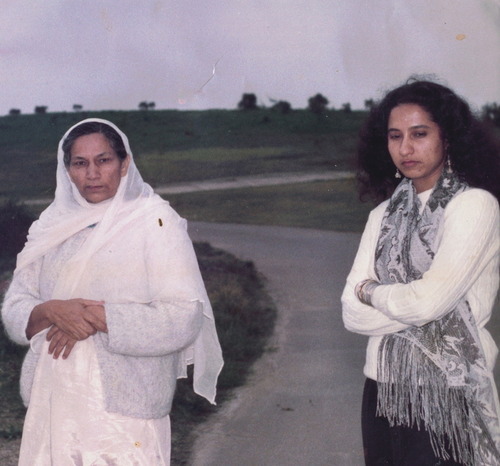BY IRUM SHIEKH

Irum and her mother.
I was in my twenties when I immigrated to the US. I wanted to have financial independence, which meant going to school and working. I also wanted to go out to clubs, learn about music, date, go on weekend trips and hang out late at night like my college and work friends.
All this did not make sense to my mother. It was OK to go and attend an educational seminar or a work meeting, but not to just hang out with friends. I became critical of my mother for being unable to recognize my needs and wants.
In Pakistan, my mother had lived a full life with a lot of responsibility. She had been adventurous, well educated and ambitious and served for many years as a respected school headmistress. But here in the US, where it was difficult even for me to establish friendships, she had none of that. She became lonely and increasingly depressed.
I wanted her to have her own friends, her own social network. Many times I suggested, “Mom, let’s go to this Pakistani Independence Day picnic in a park!” But, as she had back in Sialkot, she felt unable to escape the stigma of her divorce. “People will ask, ‘Where is your husband?’,” she would say. “I don’t want to tell them. I don’t want to go.”
Sometimes, I would get angry. “Tell them that he died.” I’d say. “That you are a widow.”
She would turn away, refuse to speak, and lie in bed.
Back home, in Pakistan, I might have taken pride in staying home to care for my mother, as it is the norm for daughters – even when it is at the expense of their youth. Here in the U.S., my co-workers would ask, “How was your weekend? What did you do?” I did not have anything to tell or share.
I felt as if my mother was an obstacle in my path. My mother, who would wear her shalwar kameez around town, did not help with the assimilated image that I was trying to create. Inside, I wanted her to walk away from me so that people wouldn’t know that I was with her.
After her death in 1991, I felt as if a big load was lifted off my shoulders. I travelled all over the world, switched careers, took on many roles and fulfilled many of my desires
Now, at the age of fifty-two, I look at myself and I see my mother in the mirror. My family, relatives and acquaintances claim that my body posture, walk, and smile remind them of her. My handwriting is a solid example. My “s” and her “s” ends in the same outward slant, and her “b” is half closed like mine. But what surprises me is how similarly we think and act.
I look back and I look ahead. I am a bit scared. However, I am walking the path of my mother—hoping that it will take me to a different end.
This is an excerpt from a full length piece that will be featured in an anthology by Asian Women United. For inquiries and submissions, please contact motherofallstories@gmail.com.
